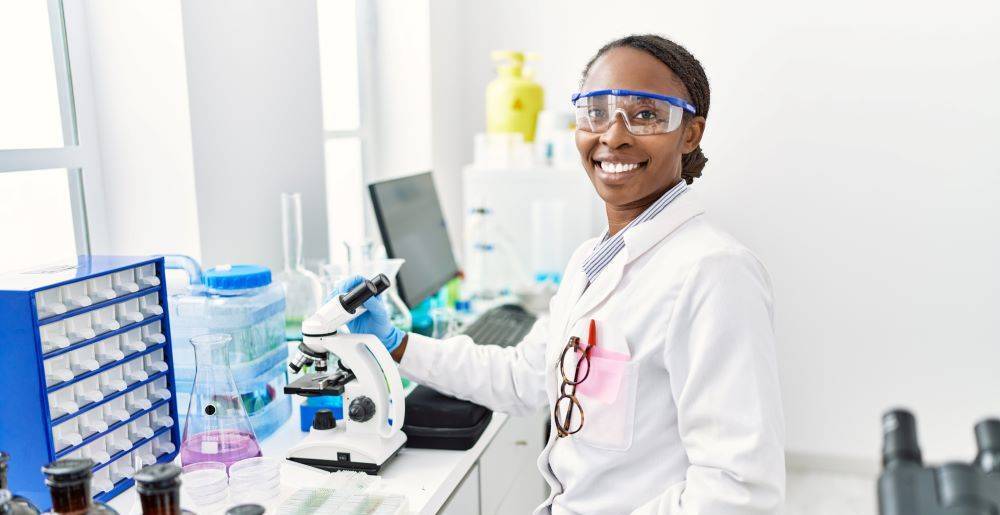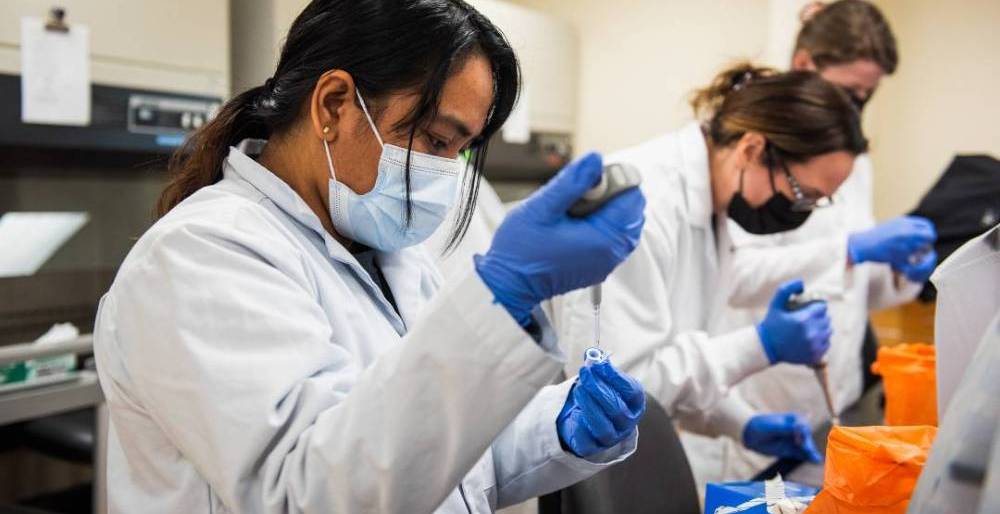Health and Public Services
BIOTECHNOLOGY
ASSOCIATE IN APPLIED SCIENCE | DIPLOMA | CERTIFICATE
The life sciences are at the forefront of innovation, blending science and technology into products and services that have a positive impact on people, animals, and the environment.
Some common examples of biotechnology include tests for COVID-19, pregnancy tests, antibiotics, biofuels, drought-tolerant crops, and genetic (DNA) testing.
There are several branches of biotechnology, including but not limited to:
- Bioinformatics
- Agricultural Biotechnology
- Medical Biotechnology
- Industrial Biotechnology
- Environmental Biotechnology
Essential Functions and Technical Standards Requirements
Purpose Statement:
All students in the Biotechnology program are expected to meet certain essential
functions/technical standards which are essential for successful completion of all
phases of the program, and which reflect industry requirements and standards. The
following technical standards represent the essential nonacademic requirements of
the Biotechnology Program that a student must master to successfully participate in
the program and become employable. To verify the students’ ability to perform these
essential functions, students may be required to
demonstrate the technical standards/essential functions.
Meeting these technical standards does not guarantee employment in this field upon
graduation. Ability to meet the program’s technical standards does not guarantee a
student’s eligibility for any licensure, certification exam, or successful completion
of the program.
Standard |
Definition of Standard |
Example(s) of Technical Standard |
| Critical Thinking/ Problem-Solving Skills |
Gain the ability to measure, calculate, reason, analyze and synthesize, integrate and apply information as it pertains to a laboratory. |
Read and comprehend relevant information in textbooks and scientific literature; identify problems related to laboratory results and determine appropriate course of action; apply safety precautions prior to use of chemicals and reagents; recognize errors and modify performance as needed; problem-solve unexpected observations or outcomes of laboratory procedures. |
| Interpersonal Skills | Ability to collaboratively work with all biotechnology students and program faculty in the classroom and student lab. |
Interact appropriately with persons from a variety of social, emotional, cultural and intellectual backgrounds; employ basic conflict management skills. Demonstrate the ability to work independently maintaining composure and competence under stressful situations. |
| Communication Skills |
Demonstrate effective written and oral communication or alternate methods in the primary language of the institution. This includes, but is not limited to, reading, following instructions, and other forms of communication. |
Writing: The ability to communicate effectively in legible written form. Speaking: The ability to verbally communicate understandably in English. Reading: The ability to read, understand, and follow directions printed in English. Technology Use: Ability to use appropriate hardware and associated software, navigate Moodle and the |
| Mobility/Motor Skills | Possess manual dexterity and fine motor skills to perform safe and effective laboratory procedures. | Ability to manipulate small objects with fingertips or adaptive devices; bilateral use of hands or terminal devices that involves coordination and strength; ability to maneuver in the laboratory, around instruments, and in confined spaces. Movement includes utilizing shoulders, arms, and neck; bending; twisting the body; standing; reaching and grasping overhead, in front of the body, and down, prolonged standing or sitting. |
| Auditory Skills | Sufficient hearing to function in a laboratory setting. | Hearing: Demonstrate hearing ability with any type of auditory aid in order to follow verbal instructions; ability to hear alarms; ability to adapt (phone receivers, hearing aids, etc.) |
| Visual | Sufficient vision to function in a laboratory setting. | Visual: The ability to distinguish red color from yellow color; distinguish clear from cloudy; and see through a microscope. Must be able to discern primary colors and/or shades thereof; and differentiate shapes macroscopically and microscopically. |
| Behavioral Skills | Behave in a safe and professional manner in regards to appropriate dress and action required for a laboratory setting. Biotechnology students should be tolerant of a variety of environmental stressors and time management skills. | Wearing safety or other required PPE and approved clothing at all times while working in the lab, regardless of the tasks being performed. Work safely with potentially infectious organisms, samples, and other hazardous materials. Follow specific regulatory guidelines in the laboratory. Remain focused and alert in a fast paced, highly stressful (sometimes unpredictable) work environment. |
Alamance Community College is committed to providing equal educational opportunities for students with documented disabilities. Students who require accessibility services or reasonable accommodations must identify themselves as having a disability and provide current diagnostic documentation to the Accessibility Services Office located in the Main Building, Room 233. All information is confidential. Please contact the Accessibility Services Coordinator for more information at 336-506-4130 or email at accessibilityservices@alamancecc.edu and notify your course instructor of your special needs, as appropriate. Students should initiate this process as soon as possible (prior to the start of classes and/or field experience).
Questions? Contact Us.
Michelle Sabaoun
Department Head
michelle.sabaoun@alamancecc.edu
336-506-4224
Meagan Vallejos
Lab Operations/ Project Manager
mlvallejos530@alamancecc.edu
336-506-4284
Dr. David Battigelli
Instructor
dabattigelli189@alamancecc.edu
336-532-5052
Dr. Izy Obi
Biotechnology Pathway Navigator
ilobi923@alamancecc.edu
336-506-4293
ACC Biowork
biotechnology@alamancecc.edu
Why Wait?YOU BELONG HERE |

